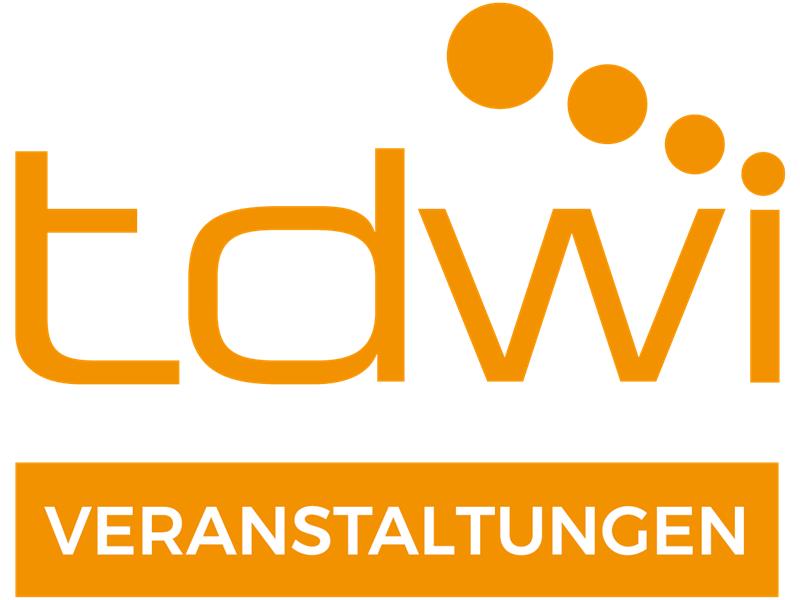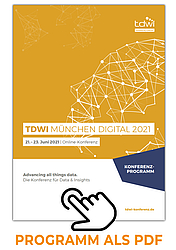
PROGRAMM
Die im Konferenzprogramm der TDWI München digital 2021 angegebenen Uhrzeiten entsprechen der Central European Time (CET).
Per Klick auf "VORTRAG MERKEN" innerhalb der Vortragsbeschreibungen können Sie sich Ihren eigenen Zeitplan zusammenstellen. Sie können diesen über das Symbol in der rechten oberen Ecke jederzeit einsehen.
Für alle, die eine alternative Darstellung bevorzugen bieten wir unser Programm-PDF an:
» Zum PDF-Download
Gerne können Sie die Konferenzprogramm auch mit Ihren Kollegen und/oder über Social Media teilen.
Track: Analyst Track
- Montag
21.06. - Mittwoch
23.06.
Big data is not the biggest change in the IT industry but data usage. To become more data driven and to succeed with their digital transformation, organizations are using their data more extensively to improve their business and decision processes. Unfortunately, it is hard for current data delivery systems to support new styles of data usage, such as data science, real-time data streaming analytics, and managing heavy data ingestion loads. This session discusses a real big-data-ready data…
Data virtualization is being adopted by more and more organization for different use cases, such as 360 degrees customer views, logical data warehouse, democratizing data, and self-service BI. The effect is that knowledge about this agile data integration technology is available on how to use it effectively and efficiently. In this session lessons learned, tips and tricks, do's and don'ts, and guidelines are discussed. And what are the biggest pitfalls? In short, the expertise gathered from…
As the data landscape becomes more complex with many new data sources, and data spread across data centres, cloud storage and multiple types of data store, the challenge of governing and integrating data gets progressively harder. The question is what can we do about it? This session looks at data fabric and data catalogs and how you can use them to build trusted re-usable data assets across a distributed data landscape.
Target Audience: CDO, Data Engineer, CIO, Data Scientist, Data Architect,…
Metadata is a long-time favourite at conferences. However, most attempts to implement real metadata solutions have stumbled. Recent data quality and integrity issues, particularly in data lakes, have brought the topic to the fore again, often under the guise of data catalogues. But the focus remains largely technological. Only by reframing metadata as context-setting information and positioning it in a model of information, knowledge, and meaning for the business can we successfully implement…
Ein sehr ernster humorvoller Blick auf die Modewellen der IT, ihre Auswirkung auf die Informationsprodukte im Unternehmen und ein methodischer Umgang mit dem Hype Cycle.
Der Mörder ist immer der Gartner, weil er bestimmt, wann ein Hype zu Ende ist und damit die Methode tötet. Typische Aussage fachfremder Menschen mit und ohne Budgetverantwortung: 'Warum machen wir das noch? Gartner sagt, dass ist nicht mehr aktuell.' Ungeachtet der Tatsache, dass die dahinterliegende Methode aus den 70ern…
The past year or two has seen major changes in vendor support for the extended Hadoop ecosystem, with withdrawals, collapses, and mergers, as well as de-emphasis of Hadoop in marketing. Some analysts have even declared Hadoop dead. The reality is more subtle, as this session shows, through an exploration of Hadoop's strengths and weaknesses, history, current status and prospects. Discussion topics include plans for initiating new Hadoop projects and what to do if you have already invested,…
This session looks at how data science workbenches and machine learning automation tools can help business analysts to become data scientists and so meet the demand of business.
Target Audience: CDO, Head of Analytics, Data Scientist, Business Analysts, CIO
Prerequisites: Basic understanding of Data Science
Level: Advanced
Extended Abstract:
The demand for analytics is now almost everywhere in the business. Analytics are needed in sales, marketing and self-service, finance, risk, operations,…
Analytics team are struggling to create, publish, and maintain analytics to meet demand. Many analytics projects fail to meet expectations and deliver value. DataOps is the new approach combining tools and approaches to simplify the development of analytics and ensuring high quality data. DataOps shortens the life cycles, reduces technical debit and increases analytics success. This session covers the best practices for the analytics team to deliver DataOps.
Target Audience: Data scientists,…

